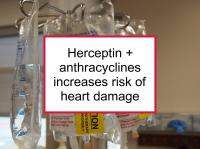A new study has found significant rates of heart damage from chemotherapy, especially for the combination of doxorubicin plus trastuzumab (Herceptin). The study was designed to investigate the association between treatment with anthracycline chemotherapy, trastuzumab, or both, and heart failure in women with breast cancer.
Clinical trials have documented the association between cardiotoxic chemotherapy for breast cancer and congestive heart failure. However, clinical trial participants do not represent typical breast cancer patient populations since they typically contain younger and otherwise more healthy women.
The study included 13,497 women from eight Cancer Research Network (CRN) health plans who were diagnosed with invasive breast cancer during the period 1999 to 2007. The Cancer Research Network consists of the research programs, enrolled populations, and data systems of 14 U.S. health maintenance organizations. To conduct the study, the authors used data from the Cancer Research Network Virtual Data Warehouse (VDW) to determine whether each woman was exposed to anthracycline chemotherapy alone, trastuzumab alone, anthracycline plus trastuzumab, other chemotherapy, or no chemotherapy. The authors also determined whether each woman had heart failure before her breast cancer diagnosis, developed heart failure after starting breast cancer treatment, or was not diagnosed with heart failure. The authors calculated the associations between heart failure and exposures for each treatment category while adjusting for age, health plan, breast cancer stage, year of diagnosis, and co-existing medical conditions.
A total of 6,420 (46.2%) of the study population received no chemotherapy, 3,857 (28.6%) received anthracycline chemotherapy only, 157 (1.2%) received trastuzumab only, 470 (3.5%) were treated with both, and 2,748 (20.4%) received other chemotherapy. A total of 1,041 (7.7%) of the women were diagnosed with heart failure after starting treatment. Anthracycline use alone was found to be associated with 1.19 times the risk of heart failure compared to no chemotherapy. Trastuzumab alone was associated with 3.02 times the risk of heart failure compared to no chemotherapy; anthracycline plus trastuzumab was associated with 6.05 times the risk; and other chemotherapy was associated with 1.36 times the risk.
These associations strengthened after excluding women from the analysis who already had heart failure before their breast cancer diagnosis or who were diagnosed with heart failure fewer than 60 days after breast cancer diagnosis. The authors conclude that the combination of anthracycline plus trastuzumab, in particular, is associated with an elevated risk of heart failure in the community setting.
Comments regarding the study
While trastuzumab plus anthrocycline chemotherapy appears to be an effective treatment combination for HER2-positive (HER2+) breast cancer, the study results indicate that the combination greatly elevates the risk of heart damage. A delay between completion of anthracycline chemotherapy and treatment with trastuzumab may be advisable, especially for those with pre-existing risk factors for heart disease. Clinical trials have reported a 2% to 3% risk of heart failure during the first five years after treatment (with a higher, but unknown, incidence over longer periods of time).
The present study reports a 7.7% rate of heart failure in a typical breast cancer patient population. The most common symptom of heart damage is shortness of breath, which may begin during chemotherapy or months or years afterwards. Breast cancer patients should undergo a cardiovascular work-up before starting chemotherapy and be monitored during therapy and afterwards for signs of cardiomyopathy.
